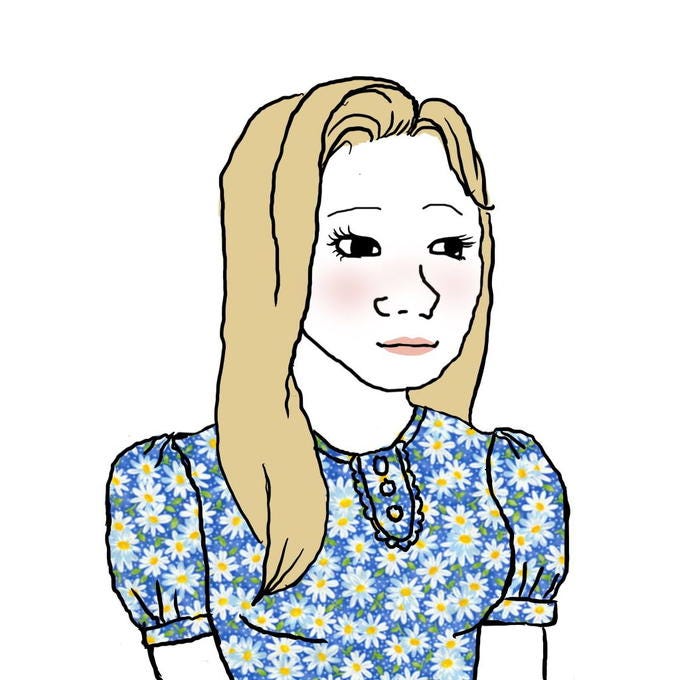REVIEW: Bronze Age Mindset, by Bronze Age Pervert
Bronze Age Mindset, Bronze Age Pervert (self-published, 2018).
What, to the mom, is nudist bodybuilding?
I tried this once, by the way. I was squatting thirty pounds at the time in the form of my nine-month-old son. The experiment had to be called off because my weight kept trying to nurse. Thus ended my brief flirtation with the alt-right. But that’s okay, because reviewing Bronze Age Mindset is a classic thing for a slightly edgy conservative writer to do to show how “hip” and “with it” they are, and I am more hip than most. It’s probably the squats.
Bronze Age Mindset is not a book for me. It’s a book for the kóryos — or at least for the alienated young males, too old to be boys but not yet really men, who would form a kóryos, if that was a thing we did…but we don’t. Which, of course, is why BAP wrote the book. Bronze Age Mindset is essentially a call for a kóryos: a call to step outside the world of women and children, outside society entire, to become something new. It’s a call to a particular sort of martial-inflected greatness, not immoral but amoral, like the κλέος ἄφθιτον of the Bronze Age epics:
From underneath comes all the Satanic power of the Babylon we are fighting. Some men, whose bond between each other must be made of titanium, will surely come around who can descend in that world…who have the mental and spiritual resources to descend to the underworld and come back with the prize. I am sure this covenant, this brotherhood of the damned, when they are taking the first steps to descend…will feel like the great mystery of things will reveal itself in its fullness to them…not the answer, ungraspable by the mind, but just this X, the madness inherent behind things will show itself as they are about to descend. …it will be an amazing rush, like when great pterodactyl cryptid bird of prey in Congo is about to swoop down in the night on its target from canopy. I know such men of bronze exist…I dream that, as they descend they will keep their eyes above on the great North Star, and I think about how they will feel…I imagine how they will traverse the great labyrinth of shadows while their spirit fixes itself with a great focus and obsession on that fateful star, and that other one…the destroyer of nations… never forgetting the way back….not forgetting its call and the eternal task it whispers into those with ears to listen.
It’s all quite thrilling, even to someone as temperamentally and circumstantially unsuited for the undertaking as I am. But it’s worth dwelling for a moment on the “Babylon” of this Untergang. What exactly is the world the book is condemning? BAP is describing decadence, but of a particular sort. It’s very different from the decadance that, say, Ross Douthat worries about: Douthat’s decadence is a barren exhaustion, a landscape of sterile aridity like the surface of the moon but without its sere beauty — the Dust Bowl, perhaps, after decades of deep plowing tore up all the roots. The decadent world of Bronze Age Mindset, on the other hand, is all too fertile. It’s the seamy underbelly of some jungle metropolis, a verdant chirping hell that throws up monsters. It’s a vision of a decaying world, rich and sick with rot, life smothered under its own superabundance, all vitality leached away by the great reddening sun — okay, I made that last part up, but it fits, doesn’t it? The book reminds me of nothing so much as the “Dying Earth” genre of science fiction, or perhaps the tired, wicked, ancient cities of Robert E. Howard’s Hyborian Age. “Hither came Conan the Cimmerian, black-haired, sullen-eyed, sword in hand, a thief, a reaver, a slayer, with gigantic melancholies and gigantic mirth, to tread the jeweled thrones of the Earth under his sandalled feet” — that’s very much the BAP vibe. And that’s what the book is, really: a vibe. It’s not a manifesto, or political program, or a clearly argued work of philosophy, any more than Nietzsche’s exhortation to build our cities on the slopes of Vesuvius is a land use plan.
The antithesis of that filthy, choking city is retvrn to the open sky, the steppe or the “new steppe of the seas” — civilizationally speaking. Life for BAP is fundamentally a struggle for the ownership of space in which to “develop inborn powers,” whatever they may be, for “the unfolding of its inborn destined form or nature.” But this is impossible without space to stretch and grow, and our society has so constrained us with its walls and its pollution — “the domestic life of the village, of the village sewer, of the fetid valleys, of matriarchy and domestics, of slaves, the pollution of cities built on filth, the life of the swamp, the life of the human animal collapsed to mere life, life for the sake of life, as it devolves to the yeast form aesthetically, morally, intellectually, physically” — that it’s no longer possible. He gives a vivid metaphor of the predicament:
When you put some kind of working dog, like terrier, even cute Jack Russell in city apartment, they will start to try to dig through the floor. This mode is inborn to them, they seek the development of their powers, and there are very few sadder things that to see animal thwarted like this. Playing at becoming itself but reduced to a doll and useless acting.
But in BAP’s telling this isn’t only our present condition — it’s also a throwback to what he describes as the pre-Indo-European “communal life of the longhouse with its old men dominated and broken by the old and sclerotic, by the matriarchs, the blob and yeast mode of human life overtaking and subjecting all higher aspirations.” Theirs was — ours is — a society that hates and fears greatness, and one in which anyone with a real thirst for “a life of conquest and expansion” will be endlessly thwarted, scolded, and shamed. Sad!
You may have noticed that women don’t come off very well here. Partly it’s that women, as life-givers, are metonym for “life for the sake of life” — it’s not an accident that Douthat, who sees cultural sterility at the heart of our problems, worries about American birth rates, while BAP, who decries the overabundance of yeastlife, just isn’t interested in women — but there’s more to it than that. BAP is pointing at the very real feminization of our elite institutions and our public life. The extremely online right, riffing on the passage I quoted above, have taken to calling this phenomenon and its various penumbras and emanations “the Longhouse” (thus joining “the Cathedral” in the right-wing imaginary of evil architecture). When Twitter anon Lomez introduced the concept to the conservative mainstream with an essay in First Things, he glossed the Longhouse as the dominance in our public sphere of “social norms centering feminine needs and feminine methods for controlling, directing, and modeling behavior.” These include an emphasis on consensus, a suspicion of competition and explicit hierarchy, and a categorical aversion to “harm.” The highest value of the Longhouse is “safety”: physical, yes, but even more psychological safety, an incredibly subjective equilibrium that can be disrupted by anything you don’t like. It’s no wonder, then, that consensus is so important! “The Longhouse,” Lomez writes, “distrusts overt ambition. It censures the drive to assert oneself on the world, to strike out for conquest and expansion. Male competition and the hierarchies that drive it are unwelcome.” It’s worth noting that although the Longhouse values are stereotypically female, they are also espoused by plenty of men; harm has become the default rhetorical pretense for the exercise of power. Here’s a clue: if someone tells you to “read the room,” you’re probably in the Longhouse. It’s rule by emotive safetyism, and it’s not hard to see why BAP hates it.
There are plenty of reasons you might dislike Bronze Age Mindset: it’s profoundly elitist, it’s deeply un- (pre-? post-?) Christian, and it’s full of terms that are definitely not the preferred nomenclature. Perhaps it’s bad — dare I say, degenerate — art. But you should confront art on the level of art, which is to say that you should ask if it is pointing us towards things that are true, or good, or beautiful. So I fear I am at risk of some epic-tier point-missing when I object to BAP’s anachronistically reading the Longhouse back into history.1 But I think this is important, so bear with me and please imagine me pushing my glasses up my nose with a forefinger as I go, “well, AAACKSHUALLY…”
BAP conflates two things we need to differentiate: a common human (bugman?) distrust of greatness, and a specifically female small c-conservatism and concern for material security. As for the first: Hunter-gatherers are almost universally opposed to any demonstration of individual excellence. As anthropologist Richard Lee discovered to his chagrin when he tried to purchase a fat ox as a Christmas gift for !Kung Bushmen among whom he was doing ethnographic research, no one likes someone who’s better than them. Strong social norms among the !Kung require self-deprecation, and if the successful hunter (or, in this case, ox-purchaser) doesn’t insult his own prowess, his neighbors are glad to do it for him. “[W]hen a young man kills much meat,” one of the !Kung finally explains to the bewildered Lee, “he comes to think of himself as a chief or a big man, and he thinks of the rest of us as his servants or inferiors. We can’t accept this. … So we always speak of his meat as worthless. This way we cool his heart and make him gentle.” Humans are naturally unequal in ability, but on a small scale and without the technology to capitalize on individual achievement, a coalition of the mediocre can always topple a “great man.” Rob Henderson's Newsletter has an extensive review of Christopher Boehm’s Hierarchy in the Forest: The Evolution of Egalitarian Behavior that goes into all this in much greater detail, but the short version is: this is an unnatural egalitarianism, it is consciously and consistently enforced by the community, and it is created and perpetuated by men.
And then, on the other hand, we have “gynocratic safetyism,” our HRified society of schoolmarms forever telling little boys they need to sit still, which is really just a public world increasingly full of women womaning. Now frankly, I should simply be able to say “women be like” and have you nod along, but in case you want me to add a veneer of social-scientific rigor to my true stereotypes, political scientist Dennis Chong reports that on moral foundations tests women “score higher on values defined by care, fairness, benevolence, and protecting the welfare of others, reflecting greater empathy and preference for cooperative social relations.” Joyce Benenson, Christine Webb, and Richard Wrangham report that “females more than males exhibit a lower threshold for detecting many sensory stimuli; remain closer to home; overestimate the speed of incoming stimuli; discuss threats and vulnerabilities more frequently; find punishment more aversive; demonstrate higher effortful control and experience deeper empathy; express greater concern over friends’ and romantic partners' loyalty; and seek more frequent help.” This all should surprise no one who has ever met a woman or thought for five seconds about what women’s roles have been on an evolutionary timescale. We give birth. We care for babies and small children, and we are responsible for nurturing and protecting them. Across cultures, “women’s work” is whatever can be done while supervising small children. Of course we’re more likely to protect and care and worry and avoid risk! We’re smaller, weaker, and we’re probably carrying a baby.
But even if these female traits, given free rein, lead to dysfunction in the workplace, they are also virtues. There is a place in the world where physical and psychological safety are paramount, where hurting someone’s feelings is properly seen as a serious offense, where the needs of the weakest should receive the greatest consideration, and where competition is inappropriate, and that place is the family. (“Sorry, sweetheart,” I say, retrieving the toddler from the top of a bookcase over his screaming protests, “you’re in the Longhouse!”) And it’s not only children who need a place of comfort, health, beauty, order, and safety: men, even men of bronze, need it too. They’re just very bad at making it. The Longhouse of our present discontents is simply these archetypically feminine traits — fairness, benevolence, empathy, cooperation, protecting the welfare of others — applied to spheres where they are no longer the highest virtues. The effect — of stifling ambition and the development of “inborn powers” — may be the same as in the prehistoric state Fukuyama calls the “tyranny of cousins,” but the cause, and therefore the solution, are quite different.
None of which is to criticize BAP for not writing a book about women. It is, as I say, not a book for me. But it is fair to criticize him for writing incorrect things about women. It’s important to distinguish between the prehistoric egalitarianism and the contemporary Longhouse, because if we don’t — if we blame the primitive aversion to conquest, adventure, and greatness on women — we posit a fundamental and irreconcilable antagonism between the sexes. And that’s bad not only because it’s false (we’re complementary!), but because a young man who sees “the endless sallow night of matriarchy” lurking behind every example of a woman’s concern for harm or feelings is never going to be able to form a happy, successful family. Of course, BAP wouldn’t see a problem with that. Towards the end of the book, where he becomes less fanciful and speaks directly to the reader, he does grudgingly concede that heterosexual pair-bonding is acceptable as concessions to human frailty: “by all means have a girlfriend and a family, but…[u]sually a family is the end of a man. This can be both good and bad. But the necessities of caring for a family, and the emotional demands, usually blind him to anything higher.” (And note that he assumes you’re shacking up with your girlfriend, not leading a wife to the hearth of your fathers.) But in general, he’s concerned with self-perfection and not with posterity:
Important to understand that there is a circular process: organism seeks mastery of space, environment, to master matter in ways particular to its own abilities, and as a result of this mastery of matter there is development of its body, its senses, and all of its faculties, and the unfolding of its inborn destined form or nature, in time, its particular form flowering in the spring of its season. … Only after full development of its powers and its mastery over space specific to its needs does the need or desire for reproduction come. Reproduction is side effect of animal desire for discharge of strength, after mastery over space is achieved.
Here I think he’s just wrong — and I think the ancient world is with me on this. Marriage, children, and on down the lines of the generations, are an integral part of human flourishing. At the very least, you need someone to pour libations on your tomb. The mastery of matter and development of the self are all well and good, but by themselves they’re sterile; without a future to beget, this is all just onanism. And, look, if you think you’ve got a real chance of being Achilles you have my blessing to go for κλέος ἄφθιτον over family: live fast, die young, leave a beautiful corpse for your bros. For everyone else: being fully human means growing up. Even Odysseus had a wife, a son, a home.
This is a book for the kóryos, but the kóryos is meant to be a temporary state followed by a reintegration into society as a man. Bronze Age Mindset never makes that transition. Perhaps it’s not meant to; not all books must be all things to all people. But for a book that’s meant to be an exhortation to the young, a vision of a better, higher, and purer world, it seems strange to stop halfway. BAP pulls back a curtain and exposes some features of our world, he suggests some steps forward — the cultivation of excellence, the reaching beyond the self. But reaching beyond the self means taking your place in the great chain of being; greatness means inscribing your will on the face of the world. It isn’t the work of a single generation. It’s dangerous to go alone! Take this.
Okay, fine, I admit I also objected to the term “Longhouse” as historically inaccurate, because the neolithic longhouse societies were intensely patriarchal and incredibly violent, and Señor Lomez said he and his editor agreed that only pedants would care about that. Which…fair.








I hope someone is making a 10 year plan for Mr. & Mrs. Psmith and Douthat to form an editor-in-chief triumvirate at First Things.
This is such a great review. I came across it for the second time today, reread it, and thought the comments section wasn’t nearly flattering enough. This is a charitable, substantive critique that exposes the virtues and the vices of a book, with almost lyrical prose. So well done.